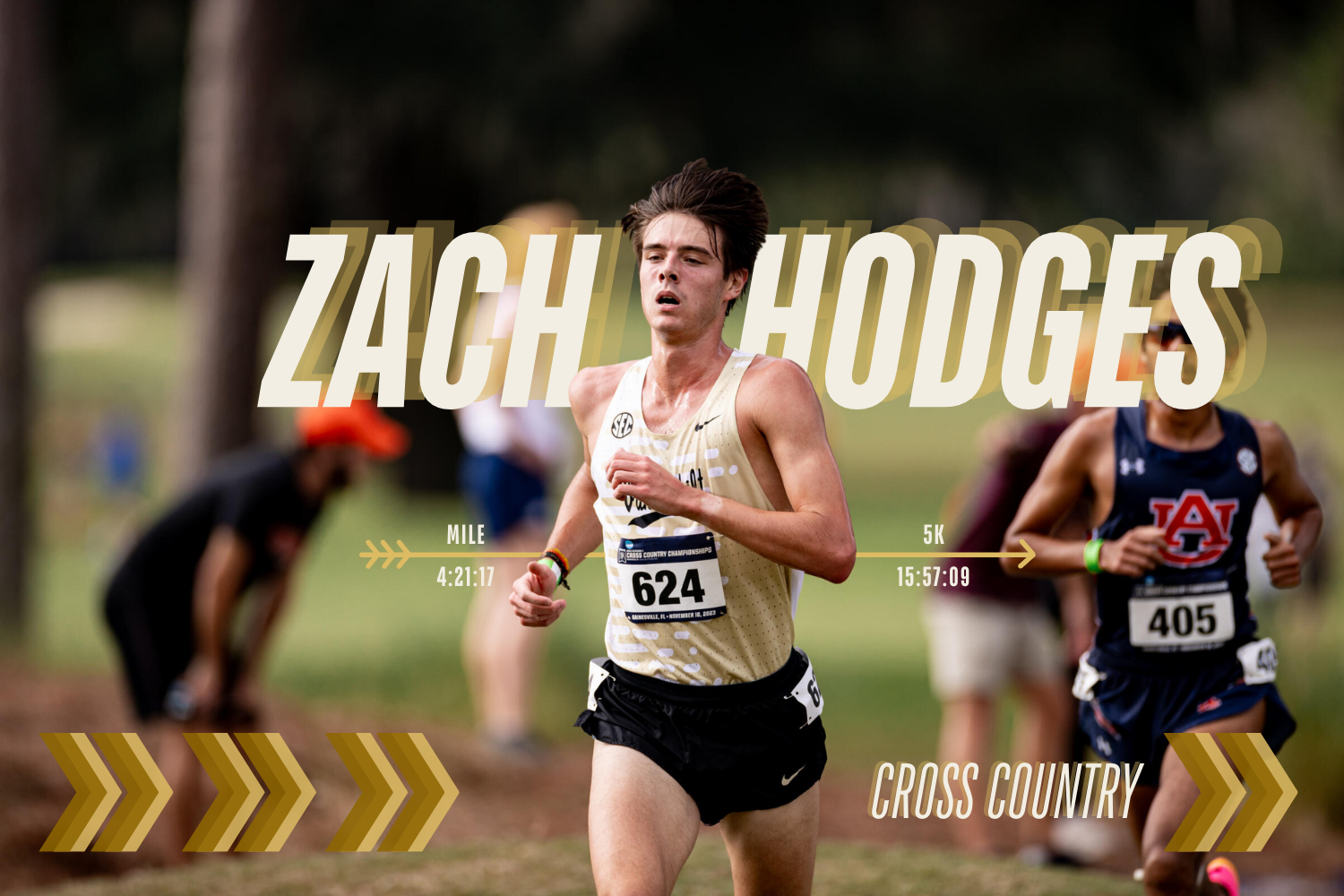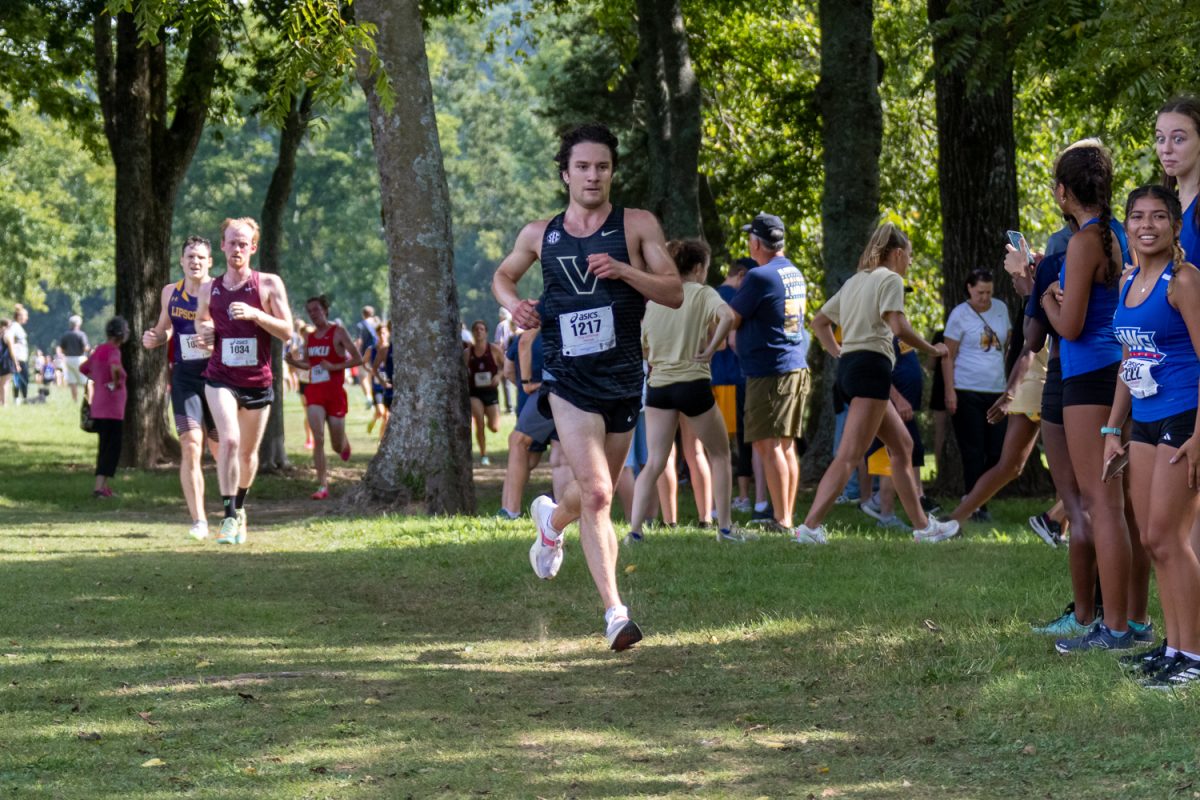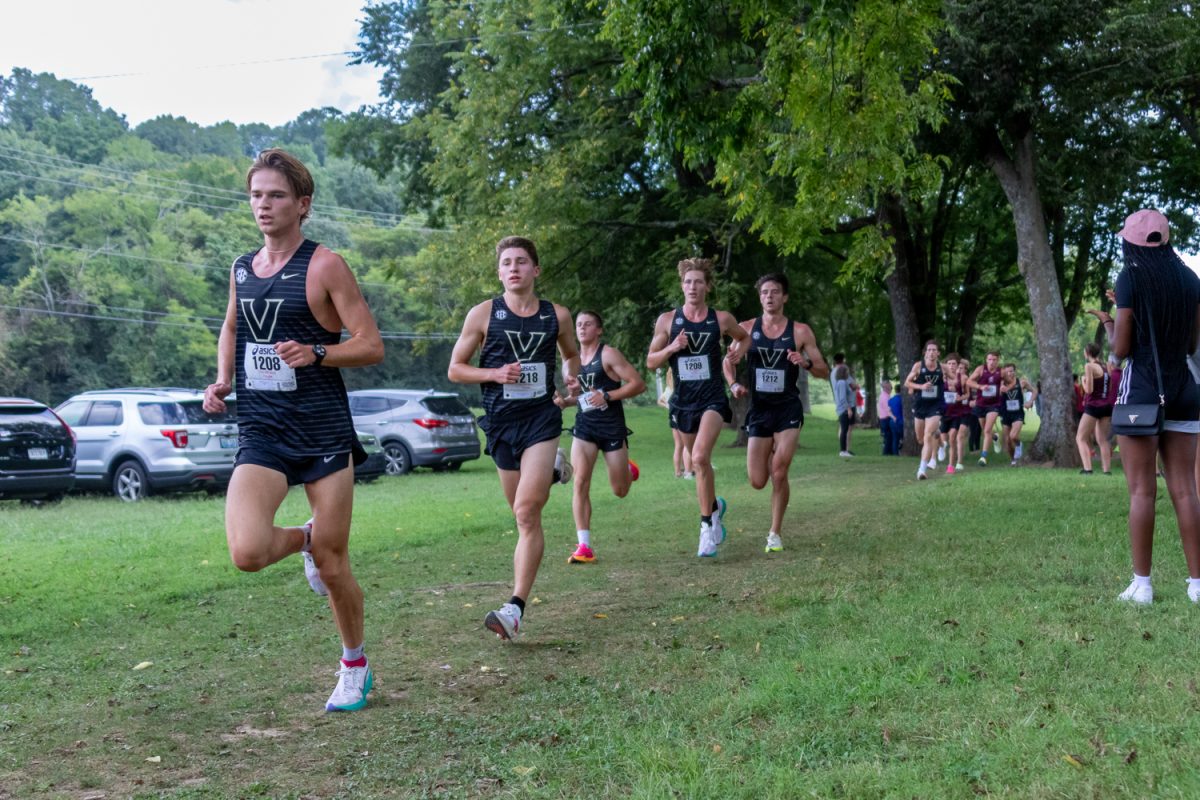There’s no more tumultuous time in an athletics program than during a coaching change. That’s exactly the situation in which then-incoming recruit Zach Hodges found himself when Vanderbilt Cross Country head coach Steve Keith stepped down in June of 2021.
The Keith regime recruited Hodges with the expectation that he’d be competing for the SEC’s premier academic institution. When Althea Thomas was named the program’s newest head coach a month later, none of the prestige of a Vanderbilt degree changed — so neither did Hodges’ commitment. Oddly enough, his recruitment received a boost from an unlikely source.
“Honestly, a lot of it was [athletic director] Candice Lee,” Hodges said. “She reached out to me and the other two freshmen at the time directly. [She] actually called me.”
Lee’s bid to keep Hodges was successful, and the New Jersey prospect found himself enrolled and attending Vanderbilt within a matter of months. It was smooth sailing up to that point, but by the time his first season started, things weren’t the easiest.
“A lot of my first year was just learning how to run different races,” Hodges said.
The jump in distances from high school to collegiate competition is the most jarring aspect of the transition for any cross country athlete: 3Ks become 5Ks, 5Ks become 8Ks (or even 10Ks), etc. That makes a freshman season challenging for anyone in the sport, especially someone whose coaching staff is still learning the ropes of a new program. Add on top of that the challenge of stepping into the SEC, the nation’s premier cross country conference, and you have a recipe for an eye-opening experience.
“The [SEC] is incredibly competitive. We’re running against some of the best runners, not just in the country, but in the world,” Hodges said. “My freshman year, I ran against multiple people who were in Paris last summer. That’s an incredibly proud feeling I have.”
Hodges’ freshman year was also different because of the abnormal composition of the team. On a roster of less than a dozen people, a whopping six were seniors. In Hodges’ mind, that meant he had just one year to learn the ropes until he would begin mentoring a younger generation. And that’s what he set out to do, but the universe had other plans.
“I had a pretty big dip in activity my sophomore spring,” Hodges said. “I got a stress reaction that took me out of the entire outdoor season when I was in probably the best shape of my life. That was a point where I was probably overtraining, doing too much and not recovering enough.”
That’s when Hodges learned perhaps the most valuable lesson an athlete — or really anyone — can learn: progress isn’t linear.
“Anyone would love to tell you it’s linear. Anyone would love to tell you it’s even exponential,” Hodges said. “In running, it’s going to be ups, and a lot of times you’re going to have pretty strong downs. One of the most important things for people who want to join our team and people who are on our team is being able to handle both of those.”
Hodges’ progress may not have been linear, but it’s definitely there. Last season, he set a personal record in the 10-kilometer race at the NCAA South Regionals with a time of 31 minutes and 41.4 seconds.
“I’ve been lucky enough to progress and get better in the three years I’ve been here, from coming in and really having no idea how to run the race distances to now being the team’s main point for racing and race strategy,” Hodges said.
The coaching staff agrees with his assessment.
“Zach has grown in his understanding and executing of managing elite training, proactive physical rehab and mental understanding,” head coach Althea Thomas said. “He is a natural leader for others but has extended his leadership by being a great example of how to attack success from every area.”
Even then, like any competitor, he’s still not satisfied with his results.
“I would love for my improvement to have been better,” Hodges said. “I’d love for me to be in a much faster place than I am now, but that’s not how it’s shaken out.”
This season, Hodges is looking to further build on that progress and leave the Vanderbilt Cross Country program on a trajectory for something greater. That’s been his goal the entire time: to leave the team better than he found it.
“We’re building this program up and making it into something that it hasn’t been able to reach in 50 years,” Hodges said. “That’s something I’m really proud of.”
To his coaches, Hodges’ legacy is still very much in active development.
“Zach’s legacy is still in the making as we continue to make amazing strides with our men’s program,” Thomas said. “He is the consummate teammate and athlete leading others and incorporating the coach’s objectives in his personal leadership style. His impact continues to grow and be effective with our growing team.”
Rather than setting something present and concrete, Hodges’ goals for his final season are more future-focused. He wants to position Vanderbilt for success down the line. The Commodores aren’t going to win the SEC this year or even compete for it. But the path to contention is one Hodges feels the program is on — and helping it along the way has become his overarching purpose.
“As a team, we’re just looking to get better,” Hodges said. “We have consistently — especially in the SEC — been shunned and not included in those conversations, but we’ve really developed and brought in guys who are going to be able to change that.”
It all ties back to his desire to be forever remembered as a representative of the Black and Gold.
“I want to be remembered as someone who saw the vision of where this team was going to be when they step on the line at nationals in the next however many years,” Hodges said. “Someone who, at every point in my career here, has been looking out for ways to improve both individually as a team, whether that’s by bringing in guys next to me or trying to create and build a culture of unity and a shared identity.”
Hodges has enjoyed that shared identity more than anything else during his time as a Vanderbilt athlete.
“Every single one of us, from the first finisher to the people not even at the meets, is driving towards the same goal every single day together,” Hodges said. “That was a really powerful thing for me to see [even] in the face of failure.”
It’s a story of ups and downs from which we could all stand to learn — a story that one day, hopefully, will have the ending Hodges envisions.








